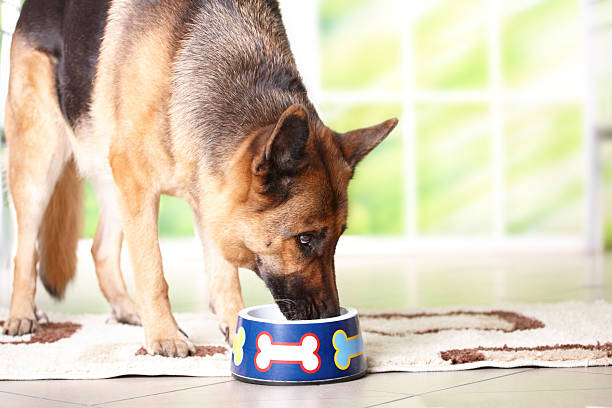Fuel Your German Shepherds Potential: Nutrition for Optimal Health
German Shepherds: A Special Breed
German Shepherds are a remarkable breed known for their intelligence, loyalty, and versatility. Whether as working dogs, family pets, or service animals, German Shepherds excel in various roles. To ensure they thrive and maintain optimal health, proper nutrition is essential.
Characteristics of German Shepherds
German Shepherds are medium to large-sized dogs with strong, muscular bodies. They have a distinctive double coat, which consists of a dense, straight or slightly wavy outer coat and a thick undercoat. The breed’s coat is known to shed, especially during seasonal changes. For tips on managing German Shepherd shedding, refer to our article on dealing with German Shepherd shedding.
These dogs are highly intelligent and trainable, making them well-suited for various tasks. They possess a strong work ethic and excel in roles such as search and rescue, police and military work, service and therapy work, and competitive sports. To learn more about the unique intelligence of German Shepherds, check out our article on the unique intelligence of German Shepherds.
The Importance of Proper Nutrition
Proper nutrition plays a crucial role in the overall health and well-being of German Shepherds. A balanced diet that meets their specific nutritional needs is essential for maintaining a healthy weight, supporting their active lifestyle, and promoting good overall health.
German Shepherds require a diet that is rich in high-quality protein, as it helps to support their muscle development and repair. Protein also aids in maintaining a healthy coat and skin. To learn more about the protein requirements for German Shepherds, refer to the section on protein requirements.
In addition to protein, German Shepherds need an appropriate amount of dietary fat. Fat provides energy and supports the absorption of fat-soluble vitamins. It also helps maintain healthy skin and a shiny coat. For more information on the fat requirements for German Shepherds, see the section on fat requirements.
Carbohydrates are another important component of a German Shepherd’s diet, providing energy for their active lifestyle. Carbohydrates can come from sources such as grains, vegetables, and fruits. However, it’s important to ensure that the carbohydrate content is balanced and appropriate for their individual needs. For more details on carbohydrate requirements, refer to the section on carbohydrate requirements.
To meet their vitamin and mineral needs, German Shepherds should have a well-balanced diet that includes a variety of fruits, vegetables, and other nutrient-rich ingredients. These essential nutrients support various bodily functions and contribute to overall health. For more information on the specific vitamin and mineral needs of German Shepherds, see the section on vitamin and mineral needs.
By understanding the specific characteristics of German Shepherds and recognizing the importance of proper nutrition, you can ensure that your German Shepherd thrives and lives a healthy, fulfilling life. Proper nutrition is just one aspect of responsible dog ownership, and it is important to consider other factors such as exercise, grooming, and training to provide a well-rounded lifestyle for your German Shepherd. For more information on caring for German Shepherds, explore our wide range of articles on various topics related to this incredible breed.
Essential Nutrients for German Shepherds
To ensure optimal health and well-being for your German Shepherd, it’s essential to provide them with a balanced and nutritious diet. This section will outline the key essential nutrients that should be included in your German Shepherd’s diet: protein, fat, carbohydrates, vitamins, and minerals.
Protein Requirements
Protein is an essential nutrient for German Shepherds as it plays a vital role in muscle development, growth, and repair. As an active and energetic breed, German Shepherds require a significant amount of protein in their diet. The recommended protein content for adult German Shepherds is around 18-26% of their daily caloric intake.
Including high-quality animal-based protein sources in your German Shepherd’s diet is crucial. This can include lean meats like chicken, turkey, and beef, as well as fish and eggs. Plant-based protein sources such as legumes and grains can also be included for variety. Remember to consult with your veterinarian to determine the appropriate protein requirements for your German Shepherd, especially if they have specific health conditions or dietary restrictions.
Fat Requirements
Dietary fat is an important source of energy for German Shepherds. It also aids in the absorption of fat-soluble vitamins and provides essential fatty acids for healthy skin and coat. The recommended fat content in a German Shepherd’s diet is approximately 10-15% of their daily caloric intake.
When selecting fats for your German Shepherd, opt for sources that are rich in omega-3 and omega-6 fatty acids. These can be found in fish oil, flaxseed oil, and other sources of animal fat. It’s important to note that excessive fat intake can lead to weight gain, so it’s essential to monitor portion sizes and adjust accordingly.
Carbohydrate Requirements
While dogs primarily rely on protein and fat for energy, carbohydrates can still play a role in their diet. Carbohydrates provide a source of fiber and can contribute to overall digestive health. German Shepherds can benefit from a moderate amount of carbohydrates in their diet, primarily from whole grains, vegetables, and fruits.
Choosing complex carbohydrates that are low in sugar and high in fiber is ideal. This can include brown rice, sweet potatoes, and green leafy vegetables. These complex carbohydrates provide sustained energy and help regulate blood sugar levels.
Vitamin and Mineral Needs
In addition to macronutrients, German Shepherds require a range of vitamins and minerals to support their overall health. These include vitamins A, D, E, and B-complex vitamins, as well as minerals like calcium, phosphorus, and zinc.
A balanced and varied diet that includes a mix of animal-based proteins, fruits, vegetables, and whole grains can help meet these vitamin and mineral needs. However, it’s important to note that certain micronutrients may require supplementation, especially if your German Shepherd has specific health concerns or dietary restrictions. Consult with your veterinarian to determine if any additional supplements are necessary.
By understanding and meeting the essential nutrient requirements of your German Shepherd, you can ensure they receive the necessary building blocks for optimal health and well-being. Remember to consult with your veterinarian to develop a feeding plan that is tailored to your German Shepherd’s specific needs, including any health considerations or weight management goals.
Feeding Your German Shepherd
When it comes to nourishing your German Shepherd, it’s essential to provide a well-balanced diet that meets their nutritional needs. There are various feeding options available, including commercial dog food, homemade diets, and raw food diets. Let’s explore each option in more detail.
Commercial Dog Food Options
Commercial dog food is a convenient and widely available choice for feeding your German Shepherd. It comes in various forms, including kibble, wet food, and semi-moist food. These foods are specifically formulated to provide a balanced diet for dogs, including essential nutrients like protein, fats, carbohydrates, vitamins, and minerals.
When selecting a commercial dog food for your German Shepherd, it’s important to look for high-quality options that are specifically designed for large breed dogs. Consider factors such as the ingredients, nutritional profile, and any special dietary requirements your dog may have. Always check the label for a statement from the Association of American Feed Control Officials (AAFCO) to ensure that the food meets the necessary nutritional standards.
Homemade Diets
Some German Shepherd owners prefer to prepare homemade diets for their dogs. This option allows you to have more control over the ingredients and tailor the diet to your dog’s specific needs. However, it’s important to note that homemade diets require careful planning and consultation with a veterinary nutritionist to ensure that your dog receives all the necessary nutrients.
A balanced homemade diet for a German Shepherd typically includes high-quality protein sources such as lean meats, fish, and eggs. It should also incorporate healthy fats, carbohydrates, and a variety of fruits and vegetables. It’s crucial to work closely with a veterinary professional to develop a balanced homemade diet that meets your dog’s nutritional requirements.
Raw Food Diets
Raw food diets, also known as raw feeding or BARF (Biologically Appropriate Raw Food), have gained popularity among some German Shepherd owners. These diets consist of raw meat, bones, fruits, vegetables, and other raw ingredients. Proponents of raw food diets believe that this approach mimics a dog’s natural ancestral diet and provides several health benefits.
If you choose to feed your German Shepherd a raw food diet, it’s crucial to ensure that the diet is nutritionally balanced and safe. Consult with a veterinary professional or a veterinary nutritionist to develop a well-rounded raw food diet plan. Proper handling, storage, and hygiene practices are also essential to minimize the risk of bacterial contamination.
When deciding on the best feeding option for your German Shepherd, consider their individual needs, preferences, and any specific dietary requirements they may have. Regularly monitor your dog’s weight and overall health to ensure that the chosen diet is meeting their nutritional needs. For more information on German Shepherd nutrition and health, check out our article on German Shepherd health guide: common issues and preventive care.
Tailoring the Diet to Your German Shepherd’s Needs
To ensure optimal health for your German Shepherd, it’s important to tailor their diet to meet their specific needs. This includes considering factors such as age, health considerations, and weight management. By addressing these aspects, you can provide your German Shepherd with the nutrition they need to thrive.
Age-Specific Nutrition
The nutritional needs of a German Shepherd vary depending on their age. Puppies have different requirements compared to adult or senior dogs. During their growth phase, puppies need a diet rich in essential nutrients to support their development. This includes higher levels of protein, fat, vitamins, and minerals. As they transition into adulthood, their nutritional needs change. Adult German Shepherds require a balanced diet that maintains their overall health and supports their active lifestyle.
For senior German Shepherds, their nutritional needs may differ due to factors such as decreased activity levels and potential age-related health concerns. It’s important to provide them with a diet that supports their aging bodies while managing their weight and addressing any specific health conditions they may have.
Health Considerations
Just like any other breed, German Shepherds may be prone to certain health conditions. These can include hip dysplasia, allergies, digestive issues, or skin problems. If your German Shepherd has specific health concerns, it’s essential to consult with a veterinarian to determine the best dietary approach. In some cases, specialized diets or specific nutritional supplements may be recommended to address their unique health needs.
Weight Management
Maintaining a healthy weight is crucial for the overall well-being of your German Shepherd. Obesity can lead to various health problems and put unnecessary strain on their joints. To manage your German Shepherd’s weight, it’s important to provide them with a balanced diet that meets their nutritional needs while ensuring they don’t consume excessive calories.
Portion control is key when it comes to weight management. Feeding your German Shepherd the appropriate amount of food based on their size, age, and activity level is essential. Consult with your veterinarian to determine the right portion sizes for your dog. Additionally, dividing their meals into multiple smaller portions throughout the day can help prevent overeating and promote better digestion.
Regular exercise is also crucial for weight management. Engage your German Shepherd in physical activities such as walks, playtime, or interactive games to help them burn calories and stay fit.
By tailoring the diet to your German Shepherd’s needs, you can ensure they receive the proper nutrition for optimal health. Consider their age, health considerations, and weight management goals when selecting the right diet for your furry friend. Regularly monitor their weight and overall well-being, making adjustments as necessary to maintain their health throughout their life.
Feeding Tips for German Shepherd Owners
When it comes to feeding your German Shepherd, there are some important tips to keep in mind to ensure their nutritional needs are met. Here are three key considerations: portion control, meal frequency, and monitoring and adjusting the diet.
Portion Control
Maintaining proper portion control is essential for managing your German Shepherd’s weight and overall health. It’s important to follow the recommended feeding guidelines provided by your veterinarian or the dog food manufacturer. These guidelines are typically based on your dog’s weight, age, and activity level.
Overfeeding can lead to weight gain and potential health issues, while underfeeding can result in nutrient deficiencies. By accurately measuring your dog’s food portions, you can ensure they receive the right amount of nutrition without excess calories. Use a measuring cup or a kitchen scale to accurately portion out their meals.
Meal Frequency
The frequency of meals for German Shepherds can vary depending on their age. Puppies require more frequent meals compared to adult dogs. Here are general guidelines to consider:
- Puppies (8 weeks to 4 months): Feed them three to four meals a day.
- Puppies (4 to 6 months): Transition to three meals a day.
- Puppies (6 months to 1 year): Two meals a day are typically sufficient.
- Adult Dogs (1 year and older): Most adult German Shepherds do well with two meals a day.
Dividing their daily food intake into multiple meals helps prevent overeating and aids in digestion. It’s important to establish a consistent feeding schedule to maintain their routine and promote healthy eating habits.
Monitoring and Adjusting the Diet
Regularly monitoring your German Shepherd’s weight and overall condition is crucial. Keep an eye on their body condition score, which involves assessing their body shape and feeling their ribs. A healthy weight range can vary depending on the individual dog, so consult with your veterinarian to determine the ideal weight for your German Shepherd.
If your dog begins to gain or lose weight, it may be necessary to adjust their diet accordingly. Gradual changes should be made to avoid digestive upset. You can consult with your veterinarian or a canine nutritionist for guidance on modifying their portion sizes or switching to a different type of dog food.
Remember to also consider your German Shepherd’s specific health needs. Some dogs may require specialized diets due to allergies, sensitivities, or underlying medical conditions. It’s important to work closely with your veterinarian to determine the best diet plan for your individual dog.
By practicing portion control, establishing a regular meal frequency, and monitoring and adjusting the diet as needed, you can ensure your German Shepherd receives the optimal nutrition for their health and well-being. For more information on German Shepherd care, visit our article on dealing with German Shepherd shedding.






